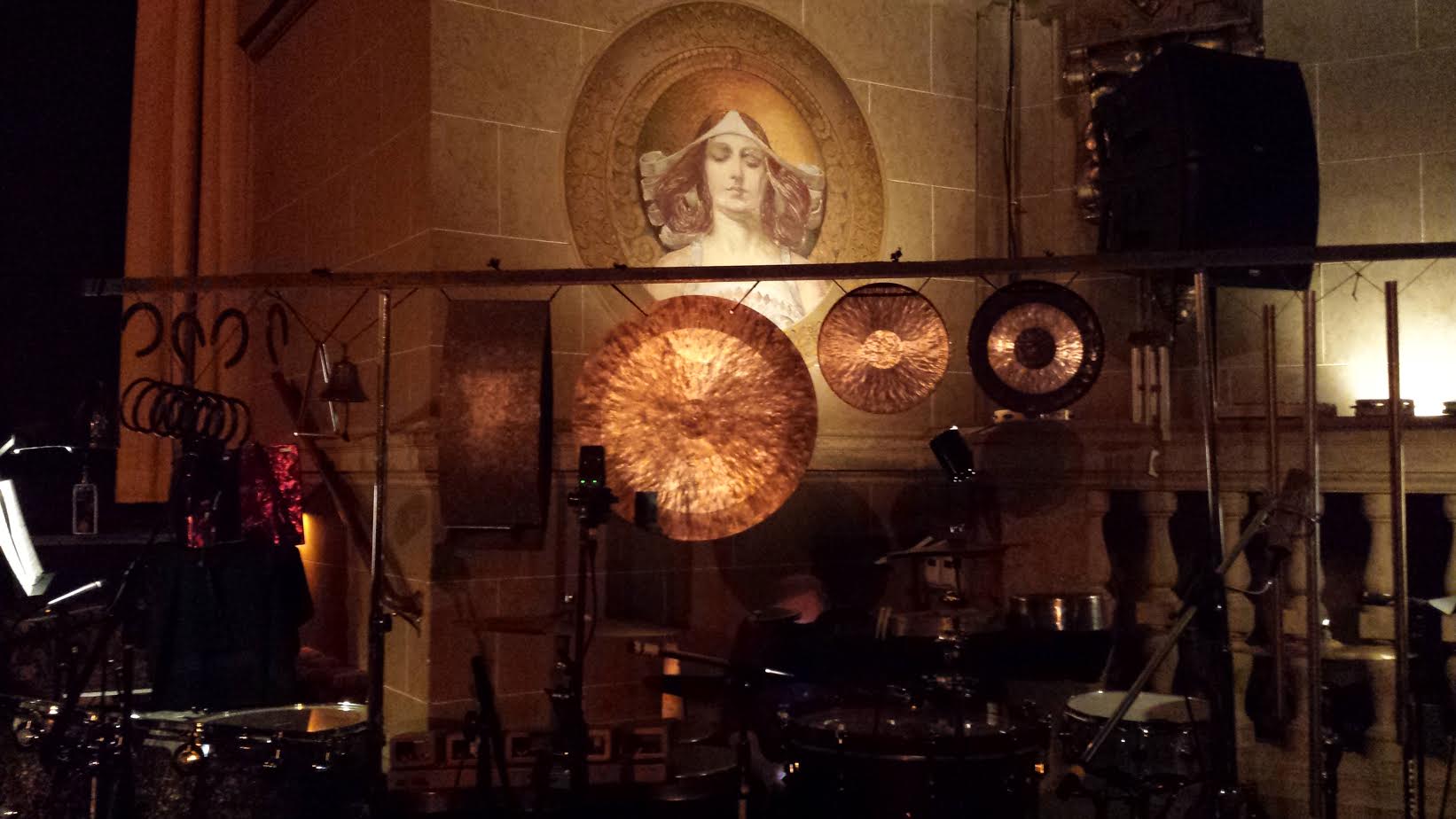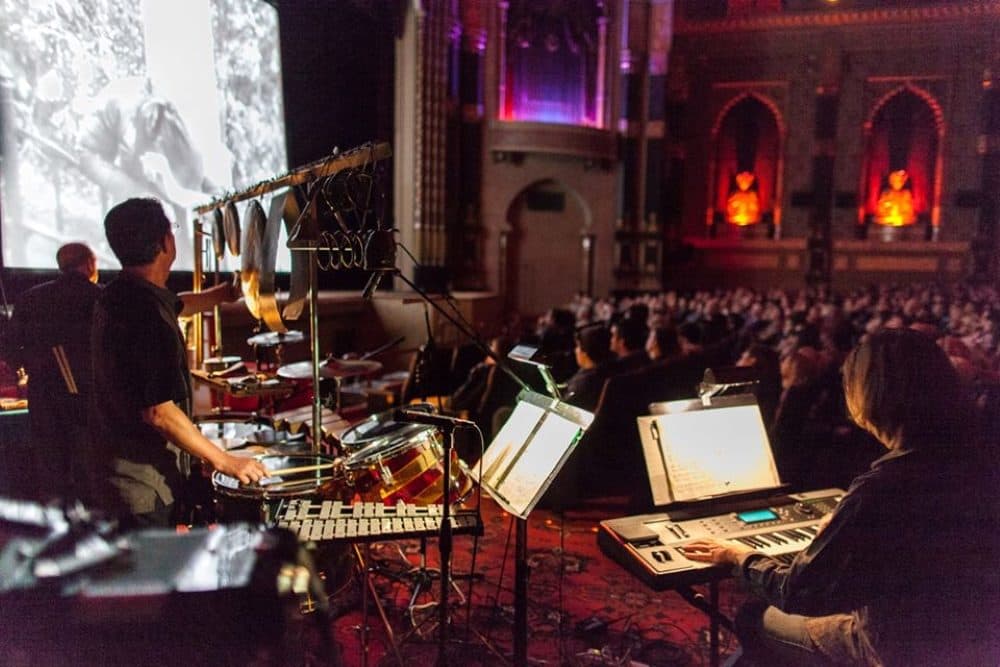Advertisement
After Three Decades, The Alloy Orchestra Has Disbanded

It all started rather modestly 30 years ago at the Coolidge Corner Theatre in Brookline. At the urging of the theater’s late executive director David Kleiler, an all-instrumental trio called the Alloy Orchestra composed and played a live, very modern and very cacophonous soundtrack to accompany a restored version of Fritz Lang’s 1927 silent film “Metropolis.”
It was a new experience for the audience, having to choose between watching the film on screen or watching the musicians who were set up along the right side of the theater. Or both. Many people did a head-swiveling act.
There was a keyboardist, Caleb Sampson, but most notably, two “junk percussionists,” Terry Donahue and Ken Winokur. Their kits included truck springs, a bedpan, horseshoes, plumbing pipes, cake pans and random pieces of sheet metal.
Winokur says in the spring of 1993, he got a call from the Telluride Film Festival in the middle of a rehearsal, offering to hire the Alloys to do a score for the upcoming festival. “I returned to the rehearsal room, and explained what had just happened,” he says, sensing this was an opportunity to take the band national. “Somebody would have to make that happen. I volunteered to do it myself and said something like, ‘I’ll manage the band for 15%.’ They instantly agreed and the discussion ended.”
Over the years, the Alloys played all over the world: Numerous appearances at Telluride, Radio City Music Hall, the National Gallery of Art, the San Francisco Silent Film Festival, the Academy of Motion Pictures, even the Louvre.
They traveled to 14 countries and accompanied soundtracks to more than 40 silent films, both feature-length and shorts, famous films like Alfred Hitchcock’s thriller “Blackmail,” Harold Lloyd and Buster Keaton comedies, F.W. Murnau’s “Nosferatu” and a Sergei Eisenstein political drama.
“I’d never been in a band that achieved a level of success where we had an international following,” says Winokur. “We were able to travel the world and play to huge adoring audiences and make a living off it.”
All things must pass. Or, perhaps, mutate.
After three decades, Alloy Orchestra is no more. Winokur has exited; Donahue and keyboardist Roger Miller, who joined in 1998 after Sampson’s death, continue on under a new moniker, Anvil Orchestra. Larry Dersch, who’d played with Miller in a previous band, Trinary System, will take Winokur’s spot in the new group.
The Anvil Orchestra makes its debut in Athens, Greece on Aug. 27, once again accompanying “Metropolis.” This time, though, it’s an extended, two-and-a-half-hour version.
Winokur, who started thinking about leaving the Alloys in late 2018, continues on with another film scoring outfit, the Psychedelic Cinema Orchestra, specializing in music that accompanies short films made by Ken Brown during the late 1960s for rock club The Boston Tea Party. He’s joined by Jonathan LaMaster and, at present, Vapors of Morphine saxophonist Dana Colley.
When Alloy Orchestra began, Winokur and Donahue were known as guys from the Boston alt-rock scene. They were joined by classically trained keyboardist Sampson, whom Winokur once described to me in a Boston Globe interview in 1998 as having “an absolute uncanny knack for creating melody” and, Donahue said, “brought in a classic romantic sensibility.”
“It was crazy,” says Donahue, on the phone, of the Alloys early days. “Just the whole thing of playing music to silent movies was forcing me to take such a leap of faith.” The musicians were used to playing in rock bands and getting a crowd reaction, and they had to adjust syncing sound to visuals. They had to adjust from creating music that existed in its own right and for its own purpose, to writing and performing music synced to serve what was happening on screen. They had to get used to hearing no applause until the end of the show.
The late film critic Roger Ebert called the Alloy Orchestra “the best in the world at accompanying silent film. …I was fascinated by the power of silent film to draw me into a reverie state so deep it is like a waking dream."

Tragedy slammed into them in June of 1998 after Sampson died by suicide. The Alloys were in the process of scoring Eisenstein’s “Strike” and had a festival approaching. Winokur asked Miller to join them. It was an obvious call. Miller, best-known as the guitarist-singer-songwriter in Mission of Burma, had been doing some sideline sound-tracking; Winokur, like Donahue, had played in one of Miller’s avant-rock bands.
As wrenching as it was inside the Alloys, they carried on, building their reputation and securing an exulted position in the world they inhabited. (After Sampson’s death, they opted to give his widow, Kathleen Hickey, 5% of the gross performance fees from his co-writes from 1991 to 1998.)
In terms of composition, the easiest parts were action scenes; the hardest part was what Donahue says they called “picnic scenes,” where little action was happening on screen. “Mostly,’ he adds, “it was Roger trying to hint at any of the other melodies in a quiet noodling way.”
Generally, though, Alloy soundtracks tended to be pretty clamorous, percussive-heavy affairs and though they scored many kinds of films, they relished it when they could amplify or enhance on-screen mayhem via their music.
“I don’t need something to generate ideas,” says Miller, “and I prefer ideas not attached to things.” Miller has played in multiple rock bands throughout his career, though Mission of Burma had split when he joined Alloy. (Burma re-formed in 2002 and quietly broke up last year.)
“I had Burma on one end, and this on the other end, this live soundtracking,” Miller says. Their job in Alloy was “explaining the speech, telling the entire story and creating a really ripping soundtrack. When Alloy was cooking, when we nailed a score in a performance, I loved that feeling — the three of us working together, hitting the cues. That’s exactly what I’m supposed to be doing in that moment.”
All three musicians always contributed to the composition process.
When the pandemic shutdown happened, Alloy work was halted, as was most everyone's. When restrictions lifted, they were offered the Athens gig, playing at the SNF Nostos Conference, with a theme of “Humanity and Artificial Intelligence.” What better film for that than “Metropolis”?
“It’s really fun to play the stuff,” says Miller, “but Ken didn’t want to continue and play there. I’m a performing musician and composer. Terry and I still need to make a living and there’s no reason not to do it that we can see.”
Winokur says he bade the group adieu and even suggested they keep the Alloy Orchestra name if they wished. Miller and Donahue opted to rename the project Anvil Orchestra, a cheeky tip of the hat to Ebert who once called them that by mistake.
But the financial situation became sticky, as to what Winokur would be paid regarding future Anvil Orchestra performances and use of Alloy music. Neither side wanted to air any further dirty laundry in public and Winokur diplomatically phrased it this way: “The former members of Alloy Orchestra are currently in negotiation about the new Anvil Orchestra performing the Alloy compositions for a variety of films.”
In a Facebook post, though, Winokur wrote: The Anvil Orchestra “keep marketing their project, and the scores that I helped compose, against my will.”
"We hold no ill will toward Ken,” responds Donahue. But “all of the Alloy Orchestra scores are joint works, which means that anyone, or more of us, can perform these scores. If Ken chooses to perform any of the scores, he has the equal right to do so. There is a 25-year precedent of payment to any composers who are not involved in the performance. We will honor that.”

